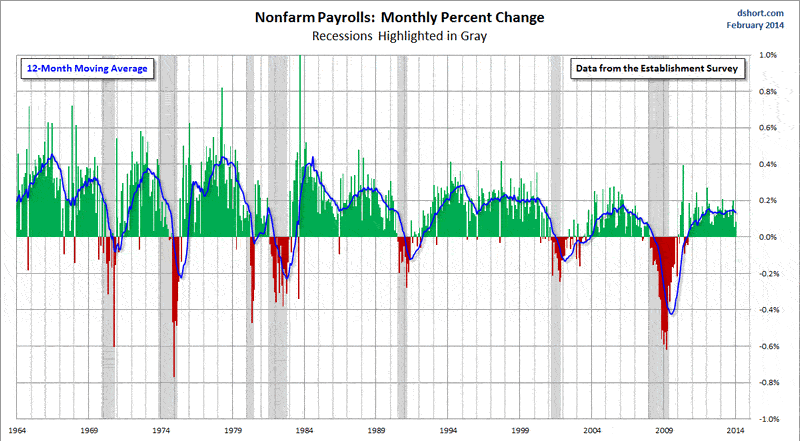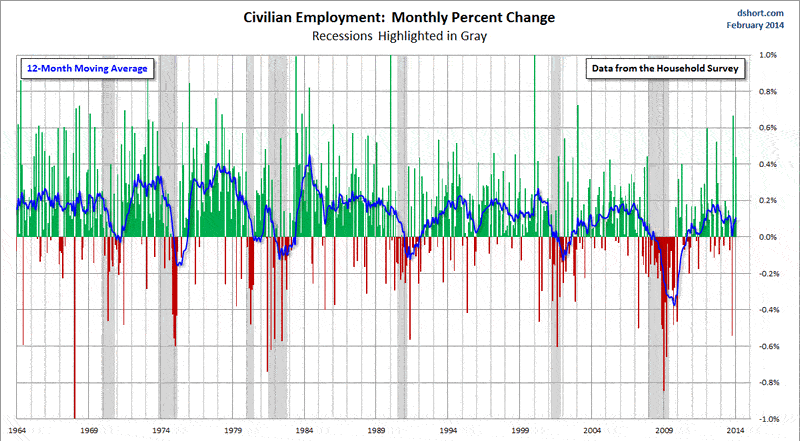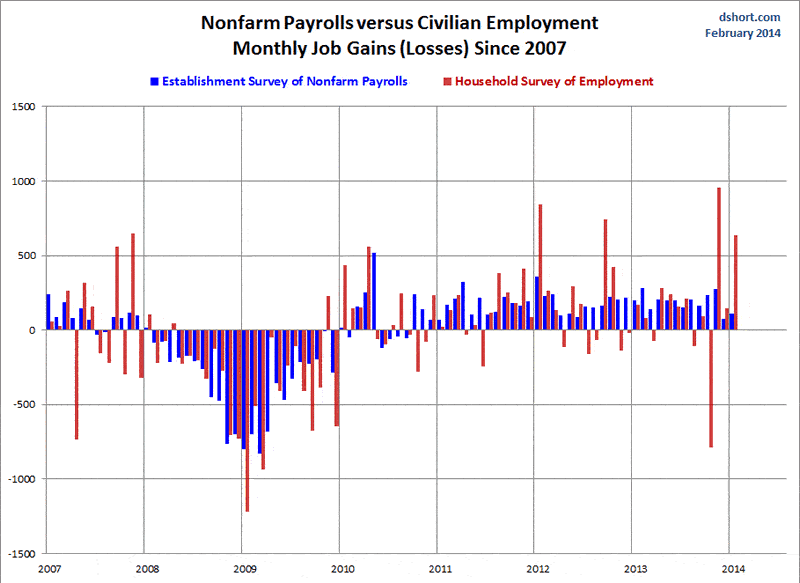Chronic U.S. Employment Data Conflict: Establishment versus Household Surveys
Economics / Employment Feb 08, 2014 - 03:39 PM GMTBy: PhilStockWorld
 Courtesy of Doug Short: Yesterday’s employment report again highlights an ongoing conflict between the jobs number in the Establishment Survey versus the roughly comparable data in the Household Survey. The Nonfarm Payrolls of the former came it at a disappointing 113K new jobs — well off the consensus forecasts for 185K or more. In contrast, the Household Survey reported a 638K increase in civilian employment age 16 and over, a number that gets trimmed to 616K after the BLS applies its “annual adjustment to the population controls.” Business Insider, not surprisingly, picked up on this oddity with the headline “By One Measure, This Was A Stupendous Jobs Report“.
Courtesy of Doug Short: Yesterday’s employment report again highlights an ongoing conflict between the jobs number in the Establishment Survey versus the roughly comparable data in the Household Survey. The Nonfarm Payrolls of the former came it at a disappointing 113K new jobs — well off the consensus forecasts for 185K or more. In contrast, the Household Survey reported a 638K increase in civilian employment age 16 and over, a number that gets trimmed to 616K after the BLS applies its “annual adjustment to the population controls.” Business Insider, not surprisingly, picked up on this oddity with the headline “By One Measure, This Was A Stupendous Jobs Report“.
Here is a fifty-year snapshot (a wide one) of the Establishment Survey data on nonfarm employment I’ve included a 12-month moving average overlay to help us visualize the trend patterns.

Now compare the data above with the Household Survey’s far more volatile monthly series on the 16-and-over employed population. Note that I’ve used the same vertical scale to ensure an apples-to-apples comparison.

The dramatically higher volatility of the Household Survey comes as no surprise, given the much larger source of survey sampling. The column chart below illustrates the sometimes radical greater monthly change in the Household Survey data for the employed.

My general tendency in studying economic data is the look at long-term trends. What I find most interesting the first two charts chart above are the moving averages. In addition to smoothing the volatility, they show us an interesting phenomenon, especially in the Employment Survey. Over this timeframe, the MA highs have been progressively lower since the peak in the late 1970s. The change has been gradual and is no doubt in part a reflection of the demographics of the Boomer generation. However, over last the 10-15 years, the trend has also been impacted by the efficiencies of technology and the globalization of the economy, which continues to put pressure on national employment data.
In past business cycles, particularly in the Establishment Survey, the 12-month MA has generally sloped downward for several months before recessions start. The one conspicuous outlier is the second half of the 1980s double-dip recession, which was essentially engineered by the Fed to break the back of runaway inflation.
At this point it is impossible to see either employment series as a harbinger of a business cycle contraction. But the 12-month MA of this indicator is one we’ll want to watch closely in the months ahead.
Have a great weekend,
- Phil
Philip R. Davis is a founder of Phil's Stock World (www.philstockworld.com), a stock and options trading site that teaches the art of options trading to newcomers and devises advanced strategies for expert traders. Mr. Davis is a serial entrepreneur, having founded software company Accu-Title, a real estate title insurance software solution, and is also the President of the Delphi Consulting Corp., an M&A consulting firm that helps large and small companies obtain funding and close deals. He was also the founder of Accu-Search, a property data corporation that was sold to DataTrace in 2004 and Personality Plus, a precursor to eHarmony.com. Phil was a former editor of a UMass/Amherst humor magazine and it shows in his writing -- which is filled with colorful commentary along with very specific ideas on stock option purchases (Phil rarely holds actual stocks). Visit: Phil's Stock World (www.philstockworld.com)
© 2014 Copyright PhilStockWorld - All Rights Reserved Disclaimer: The above is a matter of opinion provided for general information purposes only and is not intended as investment advice. Information and analysis above are derived from sources and utilising methods believed to be reliable, but we cannot accept responsibility for any losses you may incur as a result of this analysis. Individuals should consult with their personal financial advisors.
PhilStockWorld Archive |
© 2005-2022 http://www.MarketOracle.co.uk - The Market Oracle is a FREE Daily Financial Markets Analysis & Forecasting online publication.



